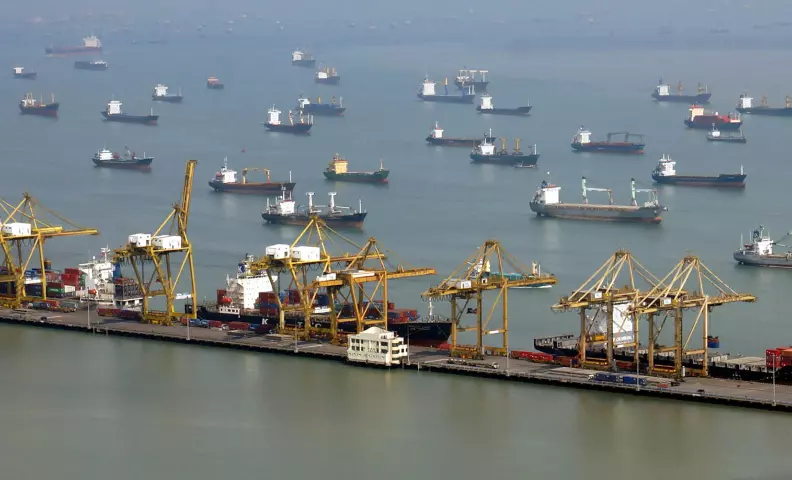Apr 24, 2022 | Insights
Understanding Lead Time in Export: A Key Factor in International Trade

Achmad Alimin

Top-view Photography of Cargo Ship With Intermodal Containers. Image Credit:
Tom Fisk, Pexels
Mappoji - Lead time plays a crucial role in the world of international trade. It refers to the
time it takes for goods to be delivered from the exporter to the importer, encompassing various
stages of the export process. Understanding lead time is essential for exporters and importers alike
as it impacts operational planning, inventory management, and customer satisfaction. In this
article, we will delve into the concept of lead time in export, its significance, factors affecting
it, and strategies for effectively managing it.
Definition and Importance of Lead Time
Lead time in export refers to the duration required for goods to be transported from the exporter's
location to the importer's destination. It encompasses the entire export process, including order
placement, production, packaging, documentation, transportation, and customs clearance. Lead time is
a critical factor in international trade as it directly influences customer satisfaction, inventory
management, and operational efficiency. Timely delivery of goods is essential for meeting customer
demands, avoiding stockouts, and maintaining strong business relationships.
Factors Affecting Lead Time
Several factors contribute to the overall lead time in export. These include:
- Distance and Transportation Modes: The geographical distance between the exporter and
importer impacts lead time. Transportation modes, such as sea, air, or land, also influence the
time required for goods to reach their destination.
- Production and Processing Time: The time required for manufacturing, processing, and
packaging the goods before they are ready for export affects lead time. Factors like production
capacity, order volume, and product complexity play a role.
- Documentation and Customs Clearance: The completion of export documentation, compliance
with regulatory requirements, and customs clearance procedures contribute to lead time. Delays
in paperwork or customs processing can significantly impact the overall time.
- Logistics and Supply Chain Management: Efficient logistics management, including
transportation scheduling, warehouse operations, and inventory management, helps streamline the
export process and minimize lead time.
In addition to these factors, it's important to consider Mappoji's
lead time for different regions:
- For Asia, including Malaysia, Singapore, Philippines, Vietnam, Thailand, Japan, South Korea,
China, Taiwan, and India, the average lead time is approximately 20-25 days.
- For the Middle East, including the United Arab Emirates and Saudi Arabia, the average lead time
is approximately 30-35 days.
- For Europe, including the Netherlands, Germany, Belgium, Spain, and Russia, the average lead
time is approximately 42-47 days.
- For America, including California and Georgia, the average lead time is
approximately 44-49 days.
These average lead times are based on the data provided earlier for specific ports in each region.
It's important to note that lead times can vary depending on various factors, and these averages
provide a general understanding of the timeframes involved in export shipments to different regions.
Strategies for Managing Lead Time
Exporters can adopt several strategies to effectively manage lead time and ensure smooth operations:
- Streamline Production Processes: Improving production efficiency, optimizing workflow,
and reducing processing time can help minimize lead time. Employing lean manufacturing
principles and efficient supply chain management practices can contribute to shorter lead times.
- Collaborate with Reliable Partners: Building strong partnerships with reliable suppliers,
logistics providers, and customs brokers is crucial. Collaborating with trusted partners who
prioritize efficiency and timely delivery can significantly reduce lead time.
- Implement Effective Communication: Establishing clear lines of communication with
customers, suppliers, and service providers is essential. Proactive communication about order
status, potential delays, and necessary information helps manage expectations and minimize
surprises.
- Utilize Technology and Automation: Leveraging technology solutions, such as supply chain
management software, automated documentation systems, and track-and-trace tools, can enhance
visibility, streamline processes, and reduce lead time.
- Monitor and Evaluate Performance: Regularly monitor and evaluate the lead time
performance to identify areas for improvement. Key performance indicators (KPIs) such as on-time
delivery, order cycle time, and customs clearance time can provide insights into the
effectiveness of lead time management strategies.
Lead time is a critical aspect of the export process, influencing customer satisfaction, inventory
management, and operational efficiency. By understanding the factors impacting lead time and
implementing effective strategies for its management, exporters can enhance their competitiveness,
meet customer expectations, and build strong relationships in the international market.
In summary, managing lead time in export requires careful planning, collaboration with reliable
partners, effective communication, and the adoption of technology-driven solutions. By prioritizing
efficient lead time management, exporters can navigate the challenges of international trade
successfully.
We look forward to hearing from you and to the possibility of working together. Please don't hesitate
to contact us. Our team is always happy to help and can provide you with
the information you need to make an informed decision.




